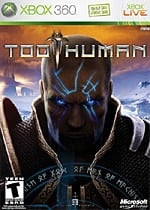Of Man and Machine
Like a debutante coming of age, Too Human has finally made its way onto the gaming scene after years of development. Silicon Knights has been utterly consumed by this project, and it is good to see they’re finally finished. A lot of the early buzz and churning of the rumor mill has been quite harsh for creator Dennis Dyack and company, but I’m happy to report the end product is a fairly polished title and a thoroughly enjoyable action/RPG. Nevertheless, it is true that the game is not the amazing gem we had hoped for, but it is a solid starting point for a trilogy that will surely improve with subsequent entries.
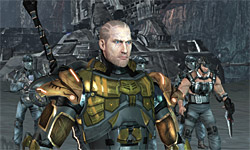
Too Human retells the all-too-familiar story of a massive, millennia-long war between man and machine. Yet, the addition of Norse mythology and the Aesir pantheon of gods into the mix does provide for an interesting twist on the formula. Players will join the fight as Lord Baldur, a tragic demigod that uses both his innately human qualities and powerful cybernetic enhancements to lead the remaining few million humans to glory in the face of an ever-growing threat from bloodthirsty machines. In addition to the mechanical menace, a rift has formed between the gods. As such, the goodly sons and daughters of ODIN (Organically Distributed Intelligence Network), including Baldur, Thor, Freya, Heimdall, Tyr, and Idunn will have to face off against the treacherous Loki and his scorned daughter, Hel. Before playing the game, I didn’t know how the blending of ancient Norse legend and futuristic technology would fare, but in the end, the seemingly disparate themes were melded expertly. The story, though at times corny, is both fresh and interesting.
Gameplay in Too Human is a fusion of heavy action gaming (like that of God of War, Ninja Gaiden, and the Devil May Cry series) with dungeon crawling and loot-collecting RPG mechanics (like that of the Diablo games). One would think comparing a title to those four franchises would spell amazing results, but it seems as if Too Human can’t quite hybridize the best of those masterful experiences into one cohesive title. That’s not to say fans of action titles and those of RPGs won’t find a lot to like here – on the contrary. It’s just that the game never fully realizes its potential, and it ends up getting caught between both genres. But I don’t want to get stuck on the negatives for now…let’s start by taking a look at what gamers are going to like about Too Human.
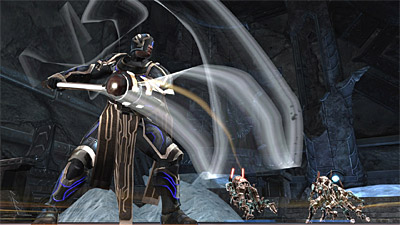
First, the unique control system in Too Human is incredibly user-friendly. Silicon Knights has given players access to all the stylized fighting they could hope for, while doing away with oppressive and monotonous button mashing. This is achieved by mapping nearly all the move combinations to the analog sticks. By holding down, tapping, rotating, and clicking RS, players will have access to nearly the entirety of their melee repertoire. As you progress in the game, certain uber-skills will get mapped to the X, Y, and RB buttons, and ranged attacks are achieved by holding down either the RT or LT buttons. This unique control scheme feels awkward during the first couple of fights, but after a half hour of gameplay, I was kicking some serious waste-disposing apparatus. Gracefully sliding from enemy to enemy, launching them into mid-air, filling them full of lead, flinging out energy from my fierce attack, and then smashing the final group of baddies with a Ruiner or finishing move was effortless. In fact, it is quite easy to dispatch a room full of enemies (20-50) in under a minute. The result is a highly stylized and cinematic approach that is fairly satisfying.
Second, the RPG conventions of character improvement and equipment upgrading are rather extensive. Players can choose from five different classes, each with their own benefits and weaknesses. The Berserker is a melee master; the Bio Engineer can heal both himself and allies; the Champion is an all-around bad ass; the Commando is a gun-toting master of ranged weaponry; and the Defender can take damage like no other. Except for the storyline, the game plays quite differently with each class. Plus, players have six save slots available to them, so they can develop various builds and find their favorite Baldur.
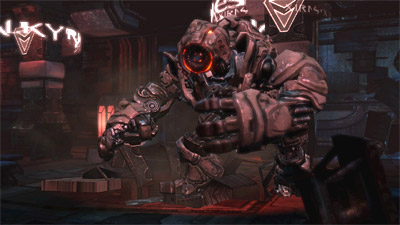
Also, the amount of random loot drops is astounding. Players will find tons of ranged weapons, swords, hammers, pauldrons, gauntlets, boots, helms, etc. that can be augmented with runes to be more powerful and, of course, more stylish. In addition to the bevy of mundane items, there are also a wide variety of elite items that imbue players with extremely useful modifiers. Moreover, the game features sets of armor and weapons that, when paired together, give their wearer abilities beyond their normal scope. Finally, scrolls called blueprints allow players to craft unique, elite items. By accumulating and then spending Bounty (the game’s currency) players can forge high-level goodies to boost their attributes and battle prowess. This loot drop mechanic will definitely attract item hounds and is a great way to customize and distinguish your champion. If organizing and managing inventories is not your thing, don’t worry too much. The game provides players with auto-salvage functions that convert obsolete items to Bounty once your inventory is full.
In addition to powerful weaponry, players constantly gain experience. This XP is then converted to improved abilities and skill points. The skill tree in Too Human is another aspect of the game that allows for great customization. By placing skill points into the branching skill path progression, players can take advantage of their class’ most rewarding talents. This really gives character development the appropriate amount of complexity.
Finally, the online co-op mode is very engaging and allows players to team up with a buddy or acquaintance; having another powerful champion of ODIN at your side makes the game much more tactically sound. After all, the grunts that surround you during the single-player campaign are, for the most part, pretty useless and quite whiny.
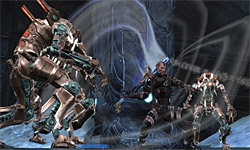
Additionally, playing co-op with various people allows you to trade for items. This will undoubtedly become a crucial component to acquiring complete item sets in a timely manner. The only mild downside concerning multiplayer is that the game is only coded to accommodate two players at a time. It would be awesome to go through the levels with four, eight, or even sixteen brawlers, going toe-to-toe with the legions of machines and Hel’s undead minions.
Unfortunately, the game isn’t without its share of problems. For starters, players will be oft troubled by the hands-off approach to camera control. Because both analog sticks are being utilized for combat, camera control is relegated to the LB button, which has a centering, third-person effect. For the most part, letting the game manage the camera provides for a cinematic experience that lets the player simply concentrate on doing battle, but when you’re backtracking or during frantic boss battles it can be a real pain. As a result, you’ll have to constantly re-center the camera while evading attacks, as the camera inexplicably tries to sweep around your hero, not letting you see where you’re headed. Camera views should have been a lot tighter to maximize the experience.
Furthermore, as smooth and engaging as combat is, it soon becomes tiresome. That’s because there are only a few different enemies you’ll face. Encounters typically include getting waylaid by a horde of one-hit underlings, doing away with their shielded leader, and progressing through several more of these fights until you reach a boss. Players will find eventually get bored fighting through the host of Goblins, Dark Elves, Trolls, and Undead that level to your ability. As such, fights always feel the same. It all gets pretty monotonous after a while.
The boss battles provide a welcomed respite to the formulaic combat. However, they can be frustrating and are dulled by cheap deaths and less-than-epic visuals. A good example of this is in the GRNDL encounter. In one of the opening cutscenes, GRNDL barges into a mead hall to slake his thirst with the blood of hapless humans. Disappointingly, there’s not an ounce of blood or gore to help the experience hit home. Then, after much chaos and an appropriate struggle, Baldur confronts GRNDL and cleanly sheers off the mechanical beast’s arm with style and ruthless panache. But during the in-game standoff, players aren’t able to take down the monster limb by limb. Weapons just bounce off the brute and you see the creature’s health meter slowly drop. The game, in general, suffers from unimpressive showers of sparks and a lack of over-the-top animations. Consequently, this is a game that is hampered by its Teen rating. I wished the crew at Silicon Knights would have gone for a much more visceral approach. By adding blood, gore, and limp-lopping goodness rather than taking on wave after wave of featureless synthetics that vaporize in a heap after mildly dispatching them, the game would have been far more entertaining.
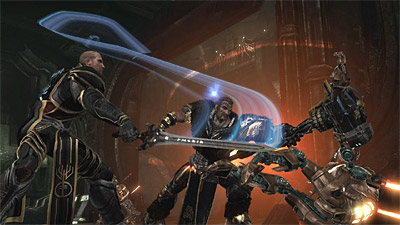
Thankfully, the overall presentation of the title is quite good. You’ll never deal with loading screens, the framerate runs remarkably well, the combat animations are smooth, and the voice acting is very professional despite the yawn-inducing dialogue. Also, the musical themes are dark and forbidding, conveying the appropriate feel to the title. Out of combat, Baldur runs a bit stiffly, but he is half robot, so I guess it’s only natural. The level design is very linear except for a few secrets uncovered by Cyberspace wells strewn throughout the game that serve as non-combat encounters to break up battle sequences. The overall crisp look of the title does a nice job of keeping the excitement alive.
Too Human is a good game that will provide most players with a lot of entertainment. Fans of both action tiles and RPGs will find a lot to like, but know that the game doesn’t nail either genre perfectly. However, loads of challenging (though repetitive) enemies, tons of customization options, an obscene amount of collectibles, and an enjoyable co-op mode make the game a pleasurable experience. Hopefully the sequels, foretold by the ending in Too Human and detailed in our one-on-one interview with Dennis Dyack, will take advantage of the game’s highlights and correct some of its faults. As it stands, the game is a fun, solid title that doesn’t quite live up to expectations.
RATING OUT OF 5 RATING DESCRIPTION 4.2 Graphics
Despite the stiff out-of-combat animations, the beautiful levels and crisp cutscenes hold their own. 4.5 Control
The analog stick combat mechanic feels awkward at first, but after a short time it feels excellent! 4.2 Music / Sound FX / Voice Acting
The musical themes are very nice, and the quality voice acting does a good job at disguising the ho-hum dialogue. 3.4 Play Value
A bit too repetitive for its own good, but the unique controls and the online co-op are quite nice indeed. 3.7 Overall Rating – Good
Not an average. See Rating legend above for a final score breakdown.
Game Features:
